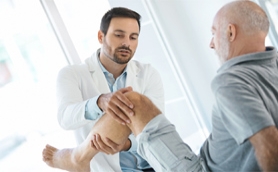
An arthritis flare-up is a sudden increase in the severity of your arthritis symptoms which may include excruciating joint pain, swelling, reduced mobility, and fatigue. Let’s consider some arthritis flare triggers and how to manage your pain.
In the case of rheumatoid arthritis, flare-ups may be caused by triggers to your immune system which include infections, certain foods, and stressful situations. Osteoarthritis, on the other hand, is a degenerative joint condition characterized by breakdown of the cartilage and formation of bone spurs that could cause joint pain. Possible triggers for osteoarthritic flare ups include repetitive movements, physical injuries, cold weather, and joint infections.
Over-the-counter non-steroidal anti-inflammatory drugs are usually the first line of treatment when dealing with arthritis flare ups. Other options include getting plenty of rest, avoiding activities that make symptoms worse, application of ice packs to reduce swelling, massage to stimulate blood flow, warm compresses to reduce joint stiffness, physical therapy, and the use of a transcutaneous electrical nerve stimulation (TENS) unit to alter the transmission of pain signals through the nerves. If the pain persists, prescription medications or pain injections may be necessary.
To identify specific triggers, it might be best to keep a journal or track your flares using an app. In general, it is best to avoid foods that cause inflammation such as sugar, saturated fats, and refined carbohydrates. Practicing relaxation techniques such as yoga or deep breathing exercises may help if stress is causing your arthritic flareup. Repeated flares of rheumatoid arthritis might be an indication that medication adjustments may have to be made, which should be discussed with your doctor.
Long-term management to prevent arthritis flares would be losing excess weight, staying active by performing moderate amount of exercise every day and using braces or supports to help take the stress off your joints.
Flares are usually temporary, and the pain should subside with conservative treatment, but if your symptoms lasts longer than 3-4 days, visit Dr. Paul Jacob for an in-depth evaluation and personalized treatment recommendation.
Dr. Jacob brings cutting edge techniques and technology to the Oklahoma City area. He has extensive training in minimally invasive, rapid recovery joint replacement as well as robotically assisted hip and knee replacement. Dr. Jacob is a pioneer in outpatient joint replacement allowing some patient to go home the same day as their procedure and recover in the comfort of their own home. The cornerstone of Dr. Jacob’s practice is to have the recovery process be easier, faster and less painful allowing his patients to get back into the game of life. Dr. Jacob is committed to bringing the highest level of orthopedic care while treating each and every patient like a family member. Providing you with patient centered care you can trust.












